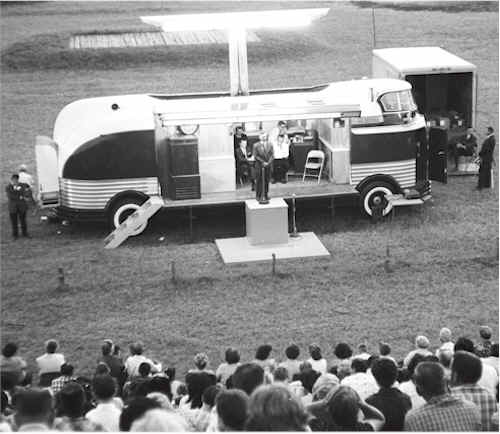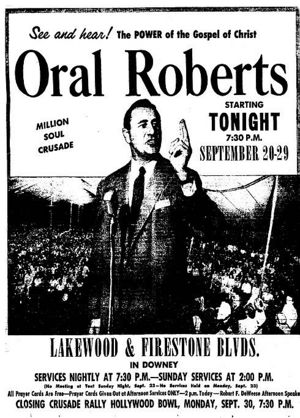
THE GUARDIAN: His message was a simple promise of health, wealth and salvation: Jesus wants you to be saved, healed and prosperous. It was a message that struck a natural chord with Americans, appealing to the desire for both material and spiritual success. His preaching gained traction far beyond Pentecostal circles. His message and his manner gained traction with me, too. As a Pentecostal teen, “on fire for the Lord,” I went through a period of devouring his writings and his broadcasts. It was the 1990s, when the UK received its first Christian satellite station, and footage from the old healing revivals was a mainstay of its programming.
There was something avuncular and reassuring about the measured, confident way Roberts would command  demons to leave and sicknesses to be healed. It was exciting to be told that Jesus would do miracles if you would “release” your faith by touching a “point of contact.” Your point of contact could be a chair, your TV, an anointed handkerchief, or even Oral Roberts himself if you were fortunate enough to be at one of his crusades. To a young Christian who wanted the best in life, his “seed-faith” concept seemed at the time a practical way to expect things from God – plant a seed and watch your miracle grow. The seed was money and the miracle was one of financial prosperity.
demons to leave and sicknesses to be healed. It was exciting to be told that Jesus would do miracles if you would “release” your faith by touching a “point of contact.” Your point of contact could be a chair, your TV, an anointed handkerchief, or even Oral Roberts himself if you were fortunate enough to be at one of his crusades. To a young Christian who wanted the best in life, his “seed-faith” concept seemed at the time a practical way to expect things from God – plant a seed and watch your miracle grow. The seed was money and the miracle was one of financial prosperity.
But it was the seed-faith doctrine and its associated ideas that were to lead to what surely will be Roberts’s most enduring legacy – his tastelessly manipulative fundraising techniques.In the 1980, he raised millions to construct his City of Faith Medical Center in Tulsa, Oklahoma, by telling followers he was commanded to build it by a 900-ft Jesus. The facility was to unite the twin healing powers of faith and medicine as never before. Along the way, God even commissioned Roberts to find the cure for cancer. When the hospital began to fail, Roberts claimed God would “take him home” – that’s “kill him” in evangelical parlance – if viewers didn’t send in $8 million. He raised the required amount and more, but City of Faith continued its spiral into debt and was shut down in 1989. The building is now an office block.
